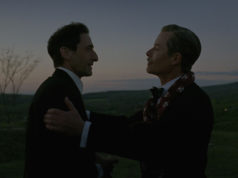How does a TV show end? We’ve seen the “main character dies” ending, we’ve seen the “all the characters die” ending, we’ve seen the ending where everyone finds new beginnings, and we’ve seen the ending where life just goes on.
Then there’s The Curse, which Christopher Nolan has said is unlike anything he’d ever seen. It’s unlike anything I’ve ever seen, too. After spending nine and a half of its 10 episodes behaving like a show whose reality is somewhat like ours, it wakes up one morning and turns that upside-down. It is officially the craziest ending to a TV show I’ve ever seen.
The couple at the heart of the show is Asher and Whitney Siegel (Nathan Fielder and Emma Stone), a recently married couple who have chosen the run-down, suggestively named town of Española, New Mexico, for their experiment in “passive housing,” building the first of what they hope will be a community of carbon-neutral sustainable homes that will be affordable to everyone. The third wheel in their marriage is Dougie Schecter (Benny Safdie), Asher’s longtime friend and a New York filmmaker who follows them around the desert with a film crew hoping to make a reality TV series about them. The show is named Flipanthropy, which is terrible and perfect.
The first episode centers on a scene that’s truly worthy of the Curb Your Enthusiasm theme music, as Dougie tells Asher to film a bit for the show with him giving money to an African girl (Hikmah Warsame) who’s selling soda in the Family Dollar parking lot. With a $100 bill as the only cash in his wallet, Asher gives the money to the girl and then takes it back once he thinks Dougie’s cameras have stopped rolling. Ignoring Asher’s explanation that he’s going to find a smaller bill to give her, the unamused girl places a curse on him and leaves.
This seems unnecessary, because the Siegels have no trouble making their own bad luck. Their houses come with no heating or air conditioning, instead using a self-regulating climate control mechanism that takes at least five hours to work every time someone opens a door or a window, something Asher explains to a prospective buyer who’s sweating through his shirt. Whitney, in her determination to be different from her slumlord parents (Corbin Bernsen and Constance Shulman), spends so much money that the company is leveraged to the eyes and can’t survive unless Flipanthropy is a hit. Her desire to present a perfect façade to the cameras runs up against Dougie’s desire for the dramatic conflict that makes entertaining television, so he plays the husband and wife against each other and exposes the cracks in their marriage.
This is a potent mix of personalities. Fielder is a master of cringe comedy as the star and creator of The Rehearsal, and his brand of humor pairs well with Safdie (his co-creator here) and his ability to portray lives an inch away from spiraling out of control. They’re both good at playing two different kinds of guys who think they’re so smooth. Dougie is a real bastard who bullies Asher and edits his TV show to make his childhood friend look like a buffoon, and when Asher finally claps back and points out that Dougie killed his wife in a drunk-driving accident, Dougie lays his own curse on Asher. (That could explain what happens later.)
He’s not even the worst character here, because self-absorbed, hypocritical, virtue-signaling Whitney takes that title. Sometimes when big-time Hollywood movie stars play in TV shows like this, you can feel them keeping one eye on their smartphones for their agents offering them the next blockbuster movie role. However, anything less than full commitment isn’t Stone’s style, and she hurls herself into the role of a woman whose colorful blouses and flirty manners disguise deep reserves of anger. The show does not miss the way the Siegels appropriate Latin and Native American culture for their purposes, and it is painful to see Whitney at an art opening rattling on about Native American art to a tribal governor (Gary Farmer).
More than painful is the scene that seems to be the series’ climax, when Whitney forces Dougie to show Asher the footage of her interviews where she says she doesn’t like her husband very much and he’s holding her back. Asher is predictably furious, but what he does with his anger is much less predictable, and both we and Whitney are horrified to learn that he is more devoted to her than ever. It takes a phenomenal performance to upstage Stone, and Fielder makes Asher’s self-abasement into something awe-inspiring.
I have a question, though: How does Whitney become pregnant? Twice, at that. Based on our one glimpse of her and Asher having sex, there’s just no way. (By the way, her first pregnancy is an ectopic one that she needs to terminate, and under our current laws, she is very lucky to live in New Mexico rather than Texas.) Like many other shows, The Curse ends with the woman giving birth, but the circumstances around her labor and Stone’s enactment of Whitney’s birthing agonies make it uniquely harrowing.
What about that ending? I’ve read at least a dozen theories put forth by fans and TV critics about what it means, and none of them have convinced me entirely. Part of me feels unsatisfied with how things end up, but Fielder and Safdie’s gambit is an inspired stroke that literalizes the idea of the Siegels’ marriage holding them back in the most insane way. Even if it doesn’t entirely work, it finds some dark truths in the New Mexico sunshine, lingering at the heart of smiley-faced home improvement TV shows. The way it comes to those is nothing less than genius.
The Curse
Starring Emma Stone, Nathan Fielder, and Benny Safdie. Created by Nathan Fielder and Benny Safdie. Rated TV-MA.












